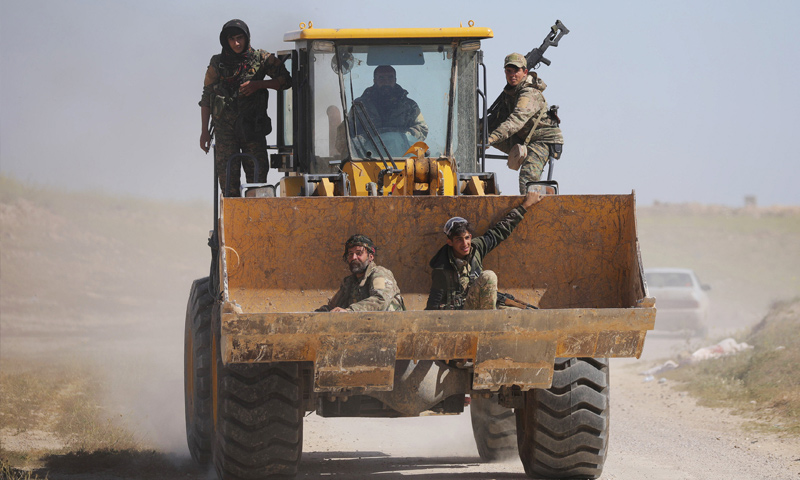



Enab Baladi – Ali Darwish
There is a Kurdish and Kurdish Syrian talk about the possibilities of reunification between two main parties in north-eastern Syria, which are the Administration of North and East Syria (NES) with its military arm, i.e. the US-backed Syrian Democratic Forces (SDF), and the Kurdish National Council (KNC), which is known for its closeness to the Turkish-backed opposition institutions.
Abdullah Kadou, member of the political bureau of the Syrian National Coalition (SNC), on behalf of the KNC, said that the SDF had previously asked the KNC to hold meetings with the aim of unifying the Kurdish front.
In an interview with Enab Baladi on January 11, Kadou pointed out to the international powers’ efforts, particularly the US with a European encouragement, to unify the Kurdish actors, while referring to a French initiative accepted by the SDF, which included offering confidence-building measures between the Kurdish parties, summarized in allowing the KNC to open offices, and making a list of the names of political prisoners, at the council’s demand.
According to the pro-NES Hawar News Agency, the SDF’s commander-in-chief of Mazloum Abdi, has launched an initiative to “unify the Kurdish political discourse”, following the start of Turkish military Operation Peace Spring on October 9, 2019, which is carried out on the ground by the Free Syrian Army.
The initiative included several steps, the most important of which is to remove the legal obstacles facing the KNC in the areas controlled by the SDF in north-eastern Syria, which will allow the former to open its organizational and partisan offices and initiate its political, media and social activities, without the need for prior security approvals. This step aims to remove all the hindrances blocking to the process of rebuilding trust between all political and administrative actors, in addition to dropping all the lawsuits filed against prominent personalities and leaders of the KNC, who are based outside the NES controlled areas without any exception.
Kadou indicated that the SDF announced losing track of its prisoners in many prisons, in addition to the fact that the KNC’s offices issue was not completely resolved; i.e. the council’s party office located in Qamishli is not authorized to carry on its activities yet, while another actor has been already granted the permission to operate in the same area.
Kadou added: “For the time being, we cannot judge the future of the relation between the KNC and the SDF, because the issue relates to the General Secretariat and the presidency of the council. In general, the KNC has been always offering solutions in a way that preserves its relationship with the Syrian national opposition and the neighboring countries, in addition to the political process subject to the Geneva Declaration of 2012, and its appendices, including the UN Resolution 2254, based on the concept of the Syrian national unity, and through a purely Syrian contribution.
The SDF formed a committee to investigate the issue of missing persons after the NES received a list of ten names submitted by the Presidency of the KNC in Syria to the leadership of the FDF, on December 15, 2019.
On January 11, the SDF announced that “after extensive investigations into the whereabouts of the disappearance of the persons, whose names were submitted to the Presidency of the KNC in Syria, it became clear that eight out of ten of these names had disappeared in the stage of chaos, and while the controlling powers overlapped on the ground, which coincided with the period when terrorist and intelligence cells, affiliated to local and regional parties, proliferated.
Abdi estimated, in a tweet, the number of missing persons in the NES controlled areas at 3286 people, from the areas of Ayn al-Arab, Afrin and east of the Euphrates, including 544 people, kidnapped by ISIS, 2368 persons kidnapped by the Free Syrian Army’s factions, and 374 others, who were abducted by the Syrian security services, in addition to eight missing persons in the SDF controlled areas.
However, this statistic was not confirmed by any independent human rights body.
On December 16, 2019, Abdi indicated that the “efforts to unify the Kurdish front in a positive manner” continue in the Kurdistan Region of Iraq, in reference to the Region’s leadership supervision of the talks held between the NES and the KNC.
During the past few years, several members of the KNC have been arrested by the NES in north-eastern Syria, while closing many offices of parties affiliated with the SNC-backed KNC.
The KNC was active in most Kurdish cities and towns on the Upper Mesopotamia, in addition to the Kurdish villages in Aleppo and Raqqa. However, the arrests made against the council’s members limited the scope of its activity during the past years.
The KNC opposes the policies of NES and its military arm, the People’s Protection Units (YPG).
In a previous report, Amnesty International accused the YPG of committing widespread violations against the Arabs and Kurds alike, including forced displacement, arrests, and oppressing individual freedoms, among other crimes.
if you think the article contain wrong information or you have additional details Send Correction